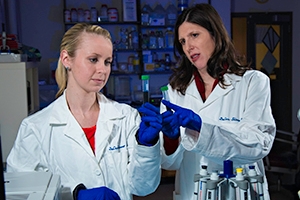Research
AU 2030: Katie DeCicco-Skinner

Katie DeCicco-Skinner (right) takes pride in helping her students.
Katie DeCicco-Skinner is all too familiar with the ravages of cancer. Having lost her father and brother to cancer, the battle is not just academic but personal. Yet the academic community—where she’s found a home as an associate professor of biology at American University—has proved fertile ground for combating and understanding the deadly disease.
More accurately, cancer is a group of diseases, which confound even the brightest biologists. “We’ve made pretty good progress,” she says of her research. “With cancer, it’s baby steps. And you just hope to be able to make one contribution towards a very large problem.”
Skin Cancer and Oncogenes
DeCicco-Skinner’s team had a significant breakthrough in 2011, which led to a National Institutes of Health grant for further study. The AU team worked with a mouse model in which the Tpl2 gene—originally thought to be an oncogene that causes skin cancer—was knocked out. Previously, there was a presumption that knocking out the Tpl2 gene would reduce the likelihood of contracting non-melanoma skin cancer. Yet after conducting these tests, DeCicco-Skinner reached the exact opposite conclusion.
“When we knocked this gene out of mice, rather than get no cancer, 80% of the animals developed skin cancer,” she explains. “If the gene’s not there, all of the sudden what happens is that the animals develop increased inflammation, and as a result, a significantly higher number develop skin cancer.”
With a finding so counterintuitive and revelatory, science journals were initially skeptical. “Many people didn’t believe us at first,” she says, before the respected journal, Oncogene, published it. “Then once our study came out, within two years, four or five additional papers were published showing how the loss of Tpl2 increased susceptibility to getting other forms of cancer.”
Her work is pertinent, because many researchers are currently trying to ascertain what genes contribute to cancer development. For the past 100 years or so, DeCicco-Skinner says, we’ve given patients non-specific medicines to target cancer. Chemotherapy is a “mixture of drugs that all just work on fast growing cells in the body, and suppresses them. It’s not going to work on everyone, and it’s not a specific treatment,” she explains.
“The way the field’s changing is in trying to identify specific mutations in people,” she continues. “We’re working more at the pathway level, and then you translate it to physicians and drug companies who can come up with better drugs to target the mutations that we have found in our system.”
DeCicco-Skinner is also researching multiple myeloma, a blood cancer often linked to obesity.
Finding Her Families
Perhaps unsurprisingly for a biologist, DeCicco-Skinner credits her interest in science to genetics. Her father was a biology professor at Catholic University, her mother was a math teacher, and DeCicco-Skinner inherited that kind of brain.
However, her career path was also inspired by exposure and example. Growing up in nearby Bowie, Md., she spent time in her father’s microbiology lab and marveled at how he mentored his graduate students. “They were like his family, a second family, and I wanted that. So I think I knew from an early age I wanted to be a professor, because I loved that interaction.”
She also considered medical school, but the allure of shaping young minds pulled her towards academia. After earning her Ph.D. from Pennsylvania State University, she did a post-doc at NIH. She came to AU in 2004 as a term faculty and eventually earned tenure.
“I feel like I can affect more lives as a Ph.D., because of the number of students I teach each year,” she says.
She now oversees a biolab group in Hurst Hall. She’s taken pride in helping all of her students, many of whom are athletes, minorities, women, and veterans.
Sure enough, her lab echoes that same warm atmosphere her father nurtured at Catholic. “My students are like my second family, and I think they feel the same way towards me. They’ll tell me about break-ups they’ve had, or whatever is going on in their life,” she says.
For DeCicco-Skinner, those relationships—and her ability to pass along knowledge—surpass any of her individual accomplishments. “I think my highlight is watching my students succeed,” she notes.
Outside of work, DeCicco-Skinner is devoted to her first family, i.e. her husband and two children, ages 10 and 8. She dabbles in photography, and outdoors activities such as running and hiking.
Cancer Research, Past and Future
In 2001, her father died of multiple myeloma, the same affliction DeCicco-Skinner studies now. Given about 18 months to live, he applied treatments on himself, guinea pig style, to extend his life for 11 more years.
With cancer research nowadays, DeCicco-Skinner keeps an eye towards the big picture, and she envisions major breakthroughs on the horizon.
Again, she expects the medicine to become more personalized. “It’s going to get to where they sequence a person’s own DNA, find what your particular mutations are, and then give you specific drugs to target those mutations,” she says. “That’s maybe 10 or 15 years down the road.”
In addition, she’s encouraged by various public investments, such as President Obama and Vice President Biden’s national cancer initiative. In fact, she recently saw Biden—who lost a son to cancer—speak at a conference in New Orleans.
“His words actually mean something, because I think a lot of times with scientists we get so caught up in understanding the mechanism that we forget the human side of things,” she says. “When I did my post-doc at NIH, every now and then I’d go to the cafeteria in the clinical building, because you’d see families there and you’d see patients there. And, I think, it would make me realize why I’m doing this.”

